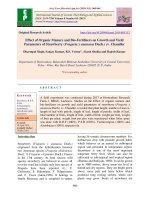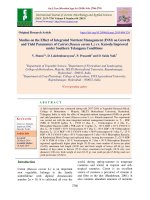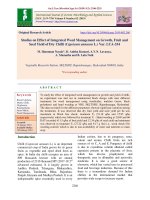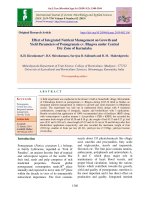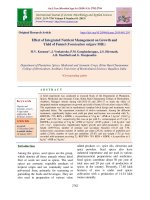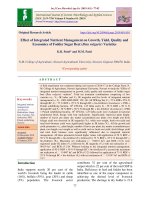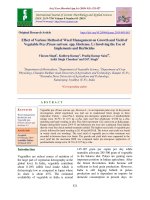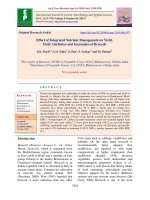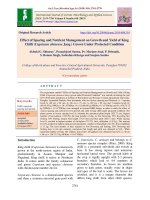Effect of integrated nutrient management on growth and yield parameters of pomegranate cv. Bhagwa under central dry zone of Karnataka
Bạn đang xem bản rút gọn của tài liệu. Xem và tải ngay bản đầy đủ của tài liệu tại đây (204.3 KB, 5 trang )
Int.J.Curr.Microbiol.App.Sci (2019) 8(2): 1340-1344
International Journal of Current Microbiology and Applied Sciences
ISSN: 2319-7706 Volume 8 Number 02 (2019)
Journal homepage:
Original Research Article
/>
Effect of Integrated Nutrient Management on Growth and
Yield Parameters of Pomegranate cv. Bhagwa under Central
Dry Zone of Karnataka
K.H. Kirankumar*, B.S. Shivakumara, Sarvjna B. Salimath and B. M. Maheshgowda
Maheshgowda Department of Fruit Science, College of Horticulture, Mudigere– 577132
University of Agricultural and Horticulture Sciences, Shivamogga, Karnataka, India
*Corresponding author:
ABSTRACT
Keywords
Pomegranate,
Central dry zone,
Integrated nutrient
management,
Growth, Yield
Article Info
Accepted:
12 January 2019
Available Online:
10 February 2019
A field experiment was conducted in the farmer‟s field at Somerhalli village, Hiriyurtaluk
of Chitradurga district on pomegranate cv. Bhagwa during 2015-16 titled as Studies on
integrated nutrient management in relation to growth and yield characters in Mrigbahar
season. The experiment was laid out in randomized block design with 9 treatment
combinations, comprising of inorganic, organic and biofertilizers with 3 replications.
Results revealed that application of 100% recommended dose of fertilizers (RDF) along
with vermicompost + poultry manure + Azospirillum + PSB + KSBT9 has recorded the
maximum fresh weight of leaf (0.28 and 0.38 g), dry weight of leaf (0.17 and 0.27 g), leaf
area (9.91 and 12.89 cm2), shoot length (35.22 and 43.33 cm) at 30 and 60 days after first
Biofertilizer application respectively, and also recorded the maximum weight of fruit
(292.61g), number of fruits per tree (61.22), yield per tree (17.93kg), yield per hectare
(16.46 t/ha).
Introduction
Pomegranate (Punica granatum L.) belongs
to family Lythraceae, regarded as „Fruit of
Paradise‟, an ancient favorite fruit of tropical
and sub-tropical regions of the world. The
fruit rind, seeds and pulp comprises of rich
medicinal
properties.
Present
global
pomegranate consumption ranks18th place
annually and expected to move onto 10th place
within the decade in view of its innumerable
nutracitical importance. The fruit contains
nearly about 153 phytochemicals like ellagic
acid, catechin and procyandins, fatty acids
and triglycerides, sterols and terpenoids,
flavonols etc. The fruit juice contains tannins,
anthocyanin, polyphenols and antioxidants A,
E and C which plays major role in
maintenance of heart blood vessels, and
proper blood circulation. Among the various
factors which contribute towards the growth,
yield and quality of pomegranate, nutrition is
the most important and it has direct effect on
production and quality. Integrated nutrient
1340
Int.J.Curr.Microbiol.App.Sci (2019) 8(2): 1340-1344
management includes, use of inorganic and
organic sources of nutrients to ensure
balanced nutrient proportions by enhancing
nutrient response efficiency and maximizing
crop productivity of desired quality. In view
of this present experiment titled as “Studies
on integrated nutrient management on growth
and yield of pomegranate (cv. Bhagwa) under
central dry zone of Karnataka‟‟ has been
designed.
Materials and Methods
The investigation conducted during 2015-16
in the farmer‟s field of Somerhalli village,
Hiriyurtaluk of Chitradurga district, titled as
“Studies on integrated nutrient management
on growth and yield of pomegranate (cv.
Bhagwa) under central dry zone of
Karnataka”. Uniformly aged135 plants spaced
at 10ftx10 ft were selected during Mrigbahar
(June-July) of 2015. There were nine
treatments along with control and each
treatment was replicated thrice in a Complete
Randomized
Block
Design.
The
recommended dose of fertilizers for
pomegranate 400:200:200 g NPK per tree
with FYM 5 tonnes per acre (12.5 tonnes per
hectare 5.4 kg/ plant) was applied during the
course of experimentation. Biofertilizers and
organic manures were procured from KVK
Babbur farm, Hiriyur. The bioferilizers like
Azospirillum, PSB, and KSB were applied at
the rate of 5 kg/ acre, (12.5 kg/ hectare, 13.61
g/ plant), poultry manure at the rate of 3.3 kg/
tree and vermicompost at 2 kg/ tree. The
recommended dose of NPK was applied in the
form of urea, diammonium phosphate and
muriate of potash, respectively. The growth
parameters like leaf fresh and dry weight (g),
leaf area (cm2), shoot length (cm) at 30 and
60 days recorded after first biofertilizer
application and the yield parameters like
weight of fruit (g), number of fruits per plant,
yield (kg/ plant),Yield per hectare (t) was
recorded.
Results and Discussion
The growth parameters were significantly
influenced by application of biofertilizers
Maximum fresh weight of leaf (0.28 g and
0.38 g), dry weight of leaf (0.18 g and 0.27 g),
shoot length (35.22cm and 45.19 cm) at 30
and 60 days after biofertilizer application was
recorded with (Table 1). The improvement in
growth might be due to the application of
biofertilizers that results in increased length
of shoots, supply of all nutrients so ultimately
increases the vegetative growth of the plant.
These observations are in conformity with
those of Khan et al., (2009) in citrus and
Khalid et al., (2013) in strawberry. The
maximum leaf area (9.91 cm2 and 12.89 cm2)
recorded at 30 and 60 days after first
biofertilizer application (Table 1). This might
be due to supply of optimum levels of
nitrogen, phosphorus and potassium. The
addition of biofertilizers like Azospirillum,
PSB and KSB resulted in higher uptake and
accumulation of nutrients in leaf tissues
which inturn ensure photosynthetic efficiency
causing greater synthesis, translocation and
accumulation of carbohydrates. These results
were similar with the earlier findings of
Sheikh and Rao (2005) in pomegranate and
Athaniet al., (2005) in guava.
The yield attributes were significantly
influenced by application of biofertilizers
(Table 2). Maximum fruit weight (292.61g)
was recorded with application of 100% RDF
+ vermicompost + Azospirillum + PSB +KSB
resulted fruit weight might be due to increase
in cell size and intercellular space. The
increase in size of fruit as a result of
application of biofertilizers might be because
it improved the internal physiology of
developing fruit in terms of better supply of
water, nutrients and other compounds vital for
their proper growth and development reported
by Dalal et al., (2004) in Sapota, Sheikh and
Rao (2005) in pomegranate.
1341
Int.J.Curr.Microbiol.App.Sci (2019) 8(2): 1340-1344
Table.1 Effect of integrated nutrient management on fresh and dry weight of leaf, shoot length and leaf area
in pomegranate cv. Bhagwa
Fresh weight (g)
Treatment
Dry weight (g)
Shoot length (cm)
Leaf area (cm2)
30th day
60thday
30th day
60th day
30th day
60th day
30th day
60th day
T1-100%RDF (control)
0.18
0.27
0.07
0.17
27.07
38.28
8.20
11.48
T2-75% RDF + vermicompost
0.25
0.30
0.09
0.19
27.93
39.00
8.64
11.88
T3-75% RDF + vermicompost +Azo+PSB
0.20
0.26
0.08
0.20
30.35
39.60
8.70
11.98
T4-75% RDF + vermicompost +Azo+PSB+KSB
0.22
0.29
0.12
0.21
32.03
40.26
8.74
12.44
T5-100%RDF + poultrymanure
0.20
0.28
0.11
0.19
31.00
39.58
8.95
11.78
T6-100%RDF + poultrymanure +Azo+PSB
0.22
0.31
0.12
0.22
31.79
41.12
9.09
12.14
T7-100%RDF + poultrymanure+Azo+PSB+KSB
0.23
0.32
0.13
0.21
32.16
42.20
9.29
12.18
T8-75% RDF + vermicompost + poultrymanure+
Azo+ PSB + KSB
T9-100% RDF + vermicompost +
poultrymanure+Azo+ PSB + KSB
S. Em.±
0.25
0.34
0.14
0.25
33.27
43.33
9.57
13.12
0.28
0.38
0.17
0.27
35.22
45.19
9.91
12.89
0.02
0.02
0.01
0.02
1.46
1.30
0.20
0.10
C.D. at 5%
0.05
0.06
0.04
0.05
4.36
3.91
0.59
0.29
1342
Int.J.Curr.Microbiol.App.Sci (2019) 8(2): 1340-1344
Table.2 Effect of integrated nutrient management on yield and yield attributes of pomegranate cv. Bhagwa
Fruit weight
(g)
245.85
Number of
fruits per plant
56.06
Yield per plant
(kg)
13.82
Yield per
hectare (t)
12.68
T2-75% RDF + vermicompost
251.82
57.06
14.38
13.20
T3-75% RDF + vermicompost +Azo+PSB
253.63
57.22
14.51
13.32
T4-75% RDF + vermicompost +Azo+PSB+KSB
254.05
57.82
14.69
13.49
T5-100%RDF + poultrymanure
254.25
57.00
14.50
13.31
T6-100%RDF + poultrymanure +Azo+PSB
260.50
56.83
14.86
13.64
T7-100%RDF + poultrymanure+Azo+PSB+KSB
266.28
56.98
15.17
13.93
T8-75% RDF + vermicompost + poultrymanure+Azo+ PSB
+ KSB
T9-100% RDF + vermicompost + poultrymanure+Azo+
PSB + KSB
S. Em.±
C.D. at 5%
290.87
60.87
17.70
16.25
292.61
61.22
17.93
16.46
2.09
0.87
0.29
6.26
0.10
0.31
0.61
1.83
Treatment
T1-100%RDF (control)
1343
Int.J.Curr.Microbiol.App.Sci (2019) 8(2): 1340-1344
The maximum fruit weight (292. 61
g),number of fruits per tree (61.00) yield per
tree (17.77 kg) and yield per hectare (15.98 t)
was recorded with Application of 100% RDF
+ vermicompost + poultry manure +
Azospirillum + PSB + KSB (Table 2). The
significant increase in fruit yield is a
cumulative effect of increase in number of
fruits because of reduction in fruit drop and
higher fruit weight by the application of
biofertilizers might have affected the
physiological process resulting into higher
production. These results in conformity with
the findings of Dutta et al., (2014)
Padmavathamma and Hulamani (1998) in
pomegranate, Kulapati et al., (2009) in
banana, Patil et al., (2005) in mango.
Thus from the present study, it may be
concluded that Application of 100% RDF +
vermicompost + poultry manure +
Azospirillum + PSB + KSB is superior than
the other treatments with respect to
improvement in growth and important
attributes contributing towards the better yield
in Mrigbahar pomegranate cv. Bhagwa under
central dry zone of Karnataka.
References
Athani, S. I., Ustad, A. I., Prabhuraj, H. S.,
Swamy, G. S. K., Patil, P. B. and Kotikal,
Y. K., (2005) Influence of vermicompost on
growth, fruit yield and quality of guava cv.
Sardar. Proceedings of the First
International Guava Symposium, Lucknow,
Dec. 5-8.
Dalal, S. R, Gorge, V. S, Jogdande, N. D. and
Moharia A., (2004) Response of different
levels of nutrients and PSB on fruit yield
and economics of sapota. Indian j. Hort.,
126-128.
Dutta, R. S. K., Takawale, P. V., Chatterjee, R.
and Hnamte V., (2014) Yield and quality of
pomegranate as influenced by organic and
inorganic nutrients. The Bioscan, 9(2): 617620.
Khan, A.M.A., Begum, H. and Lakshmi, S.,
(2009) Effect of integrated nutrient
management on growth and chlorophyll
content of acid lime in calcareous soils.
Indian j. Hort., 66(3): 385-389.
Khalid, S., Qureshi, K. M., Hafiz, I. A., Khan, K.
S. and Qureshi, U. S., (2013) Effect of
organic amendments on vegetative growth,
fruit yield and quality of strawberry.
Pakistan J. Agric. Res., 26(2): 104-112.
Kulapati, H., Narayana, J. and Venkatesha. J.,
(2009) Effect of integrated nutrient
management on growth and yield of banana
cv. Dwarf Cavendish (AAA). J. Asian
Hort., 5 (4):127-130.
Padmavathamma, A. S. and Hulamani, N. C.,
(1998) Effect of N and K nutrition on
growth and yield of pomegranate cv. Jyoti
and RCR-I. Karnataka J. Agric. Sci., 11(4):
1126-1128.
Patil, D. R., Patil, H. B., Prasanth J. M. and Patil
S. N., (2005) Studies on integrated nutrient
management
strategies
for
higher
productivity in mango cv. Alphonso.
Karnataka J. Agric. Sci., 18(3):862-864.
Sheikh, M. K. and Rao, M. M., (2005) Effect of
split application of N and K on growth and
yield of pomegranate. Karnataka J. Agric.
Sci., 18(3): 854-856.
How to cite this article:
Kirankumar, K.H., B.S. Shivakumara, Sarvjna B. Salimath and Maheshgowda, B.M. 2019.
Effect of Integrated Nutrient Management on Growth and Yield Parameters of Pomegranate cv.
Bhagwa under Central Dry Zone of Karnataka. Int.J.Curr.Microbiol.App.Sci. 8(02): 13401344. doi: />
1344
